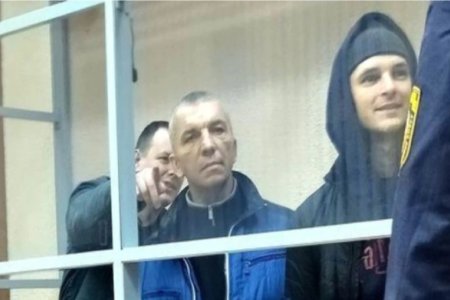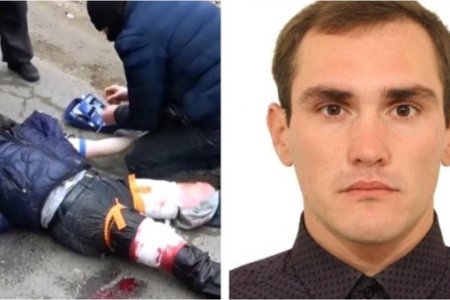
A closed court in Belarus has passed two more 22-year sentences on two men whose actions probably helped prevent Russia from succeeding in taking Kyiv in the first month of its full-scale invasion. All of these ‘trials’ are held behind closed doors, with details therefore scant, however this trial was rather different, as there were three defendants, but one was sentenced only to 18 months for supposed ‘failure to report a crime’.
According to the Viasna Human Rights Centre, the three men: Dzmitry Klimau (b. 1993); Uladzimir Auramitsau (b. 1994) and Yauhen Minkevich (b. 1994) were seized in the early hours of 30 March 2022, with Klimau wounded during the detention. A video was broadcast by the Belarusian interior ministry a full week later, on 6 April, showing three men, with two of them having been clearly beaten and one, Dzmitry Klimau looking as though he had been shot in both knees. The ministry spokesperson claimed that the men had “resisted and tried to escape”, and that weapons had been used against them, with one of the men in hospital and the others given medical assistance on the spot.
While it would be logical for the men to try to escape, it seems much less likely that three men would try to fight a large contingent of heavily armed enforcement officers. Viasna also quotes the Association of Railway Workers as saying that men who have not shown any resistance have been deliberately shot in the knees after being detained, Indirect confirmation of that is seen in the suspicious similarity between the injuries to Klimau and those inflicted upon another ‘rail partisan’ Vitaliy Melnik.
The ’trial’ of Klimau, Auramitsau and Minkevich, all from Bobruisk, began on 23 January behind closed doors at the Mogilev Regional Court, under ‘judge’ Ihar Shvedau. At that stage, it appeared that all three men were facing the same serious charges, namely ‘state treason’ (Article 356 § 1); an act of terrorism by an organized group (Article 289 § 3); participation in an organization to carry out terrorist activities (Article 290-4 § 2); deliberately disabling transport or communication routes (Article 309 § 4) and not reporting a crime (Article 406 § 2). The charges were based on the alleged destruction of two signal boxes in the Osypovytsky district.
It was claimed that the men had been linked with the ‘Peremoha [Victory] Plan’ and with ByPol. The latter is a Poland-based group of former security service officers who resigned after the rigged 2020 presidential elections and savage crackdown on the mass protests that erupted after Aleksandr Lukashenka claimed that he had won, rather than Sviatlana Tsikhanouskaya. The Lukashenka regime has since imprisoned huge numbers of Belarusian citizens and claims that ByPol is an ‘extremist organization’.
On 10 February, it was learned that Klimau and Auramitsau had been sentenced to 22 years in a harsh-regime prison colony, with a huge fine also imposed. Minkevich, who had initially also been imprisoned in a SIZO [remand prison] was sentenced to only 18 months imprisonment for ‘not reporting a crime’ (under Article 406 § 2 of the Belarusian criminal code). The year of this sentence still unserved was waived under an amnesty law.
The surprise charge and sentence in Minkevich’s case may have been the reason why the ‘Bobruisk rail partisans’ had not been added to the notorious ‘List of terrorists’ or ‘List of extremists’.
Here, as in other cases, the Lukashenka regime tries to present the actions of any rail partisans as being for profit, with the police report on 6 April even naming a (fairly small) amount supposedly offered. The aim here, and in Russia, is clearly to present partisan resistance as being ‘terrorism’ and carried out for money. There are no grounds for believing this to be the case, and all of the men imprisoned on such charges are recognized as political prisoners.
The Belarusian ‘railway partisans’ followed in the tradition of those partisans during the Second World War who tried to stop supplies, etc. to the Nazi invaders of Belarus. In February 2022, the Lukashenka regime collaborated with Russia in its full-scale invasion of Ukraine by allowing Russian men, military equipment, etc. to be transported through Belarus. It was this that courageous Belarusians tried to obstruct by putting signals boxes and other railway equipment out of action. They played an invaluable role in causing delays in Russia’s transportation of its war machine to Ukraine, and deserve our gratitude and help in publicising such savage reprisals from the regime.
See also: 21-23-year sentences for three Belarusian heroes who helped Ukraine stop Russia from taking Kyiv
Belarusian rail partisan sentenced to 16 years for obstructing Russia’s invasion of Ukraine



